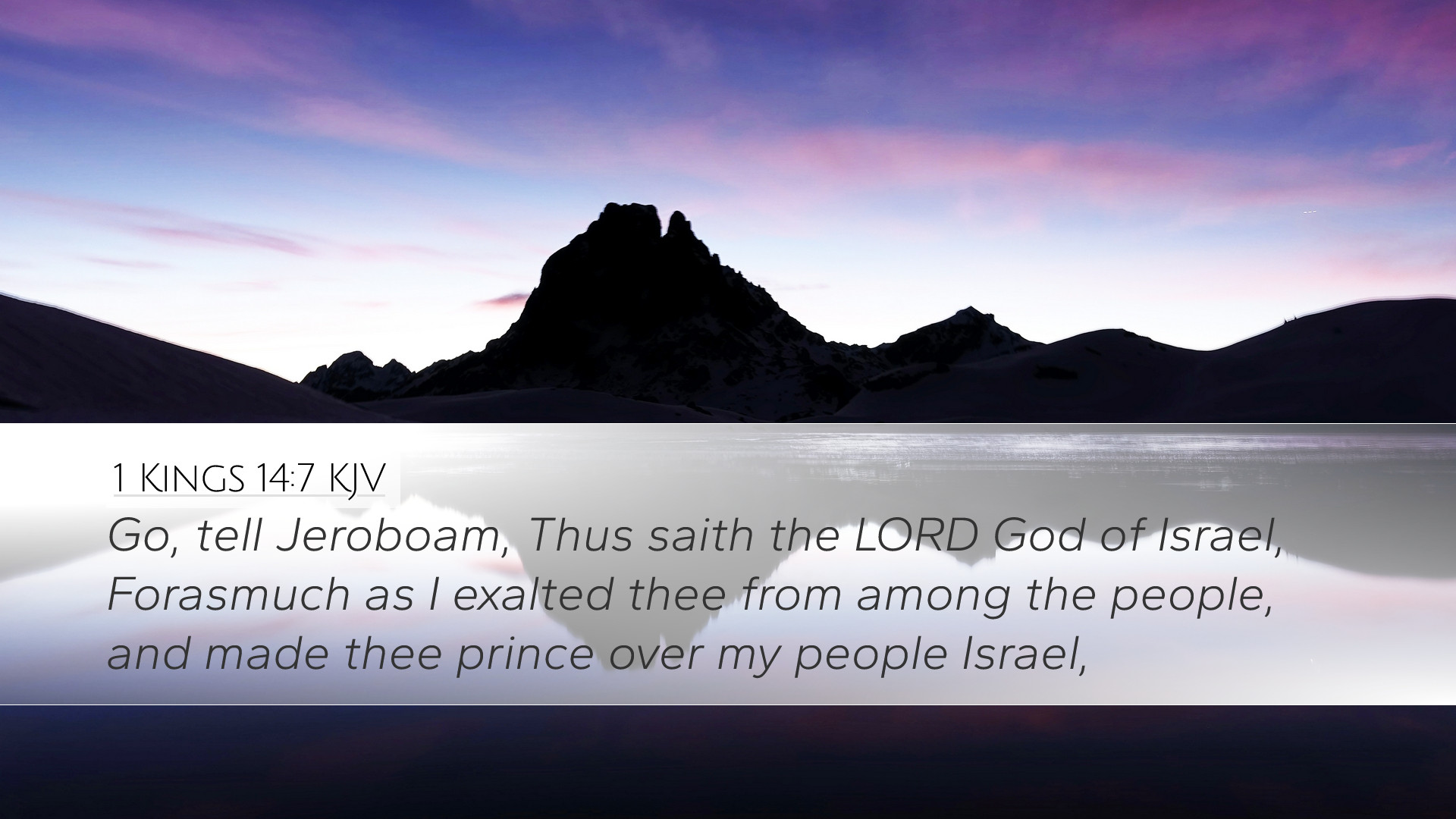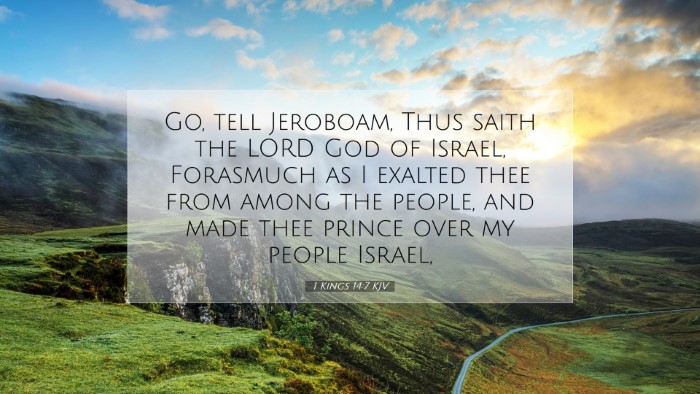Commentary on 1 Kings 14:7
Verse: 1 Kings 14:7 - "Go, tell Jeroboam, 'Thus says the LORD God of Israel: Because I exalted you from among the people and made you ruler over My people Israel,'"
Introduction
This verse serves as a pivotal declaration from the Lord through the prophet Ahijah to Jeroboam, marking the divine authority behind Jeroboam's rise to power. It reveals themes of divine sovereignty, responsibility, and the consequences of disobedience. The commentaries from various esteemed theologians help unpack the significance and implications of this statement for both Jeroboam and the future of Israel.
1. The Sovereign Choice of God
In this verse, we observe that God explicitly reminds Jeroboam of his humble beginnings and exaltation. Matthew Henry notes that God’s choice of Jeroboam was sovereign; he was taken from among the people to fulfill a specific purpose. This highlights God's ability to raise leaders from unexpected places, a theme that is consistent throughout Scripture.
- Divine Sovereignty: God's control over nations and leaders is a recurring theme. As Albert Barnes emphasizes, God not only chooses leaders but also equips them for their roles.
- Humility Before Exaltation: Adam Clarke points out that Jeroboam's rise is a reminder of the need for humility, as it is God who orchestrates the affairs of men.
2. The Weight of Responsibility
Jeroboam's selection as king carries immense responsibility. When God elevates an individual to a position of leadership, there is an expectation of adherence to His statutes. Henry comments that while Jeroboam was chosen to lead, he was also held accountable for his actions and decisions as a ruler.
- Leadership Accountability: Leaders are called to lead with integrity and to follow God’s commandments. Clarke illustrates that Jeroboam's failure in this regard would have dire consequences not only for him but for the nation as well.
- Example of Warning: Barnes articulates that throughout the Old Testament, God’s warnings serve to remind leaders of their divine obligation, setting the stage for the repercussions of Jeroboam's forthcoming actions.
3. The Nature of Divine Promises
God’s choice of Jeroboam came with promises, including the establishment of a lasting dynasty, contingent on obedience. Matthew Henry observes that the promise contains both grace and stipulations; while God generously grants leadership, it is paired with truth and righteousness expected from Israel’s king.
- Conditional Promises: Clarke emphasizes that divine promises often include conditions. In Jeroboam's case, unwavering fidelity to God would secure his legacy.
- Covenantal Relations: Barnes points out that Israel’s covenant with God required not just obedience but also a heart attuned to God's will, a hallmark of effective leadership.
4. The Consequences of Disobedience
This verse foreshadows the impending consequences of Jeroboam's forthcoming disobedience. Henry highlights that Jeroboam would soon turn from Yahweh and lead Israel into idolatry, resulting in severe judgment from God. This is a poignant reminder for leaders about the weight of their influence and the repercussions of deviating from God’s path.
- Historical Context: Clarke provides an overview of Israel's history showing that each leader’s fidelity to God directly impacted the nation's spiritual and political wellbeing.
- Call to Faithfulness: Barnes underscores the importance of remaining faithful to God’s calling, using Jeroboam’s story as a cautionary tale for future leaders.
5. Theological Implications
The narrative surrounding Jeroboam holds significant theological implications regarding God’s sovereignty and humanity's response to it. Each commentary draws attention to the balance between divine sovereignty and human agency.
- The Sovereignty of God: The acknowledgment of God’s sovereign hand in bestowing leadership urges leaders to remain humble and obedient, as highlighted by all three commentators.
- Understanding the Divine Dilemma: The tensions between divine foreknowledge and human freedom are evident in Jeroboam’s story, prompting theological reflections about God’s plans and human actions.
Conclusion
1 Kings 14:7 encapsulates a critical moment in the narrative of Israel’s monarchy, bringing to light the themes of divine appointment, accountability, and the serious nature of leadership. Through the lens provided by Matthew Henry, Albert Barnes, and Adam Clarke, this verse serves as a profound reminder for pastors, students, and scholars alike about the nature of God's call and the responsibility that accompanies it. The story of Jeroboam ultimately serves as a cautionary tale about the destructive consequences of straying from God's intent, spotlighting the necessity of faithful stewardship in positions of authority.


